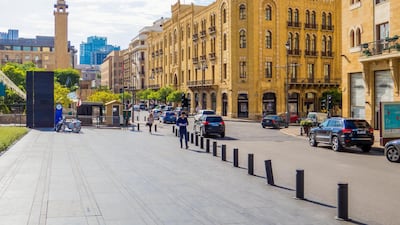Lebanon recorded its highest rate of business activity in almost two and a half years, although its economy continues to shrink, new survey data shows.
The BLOM Lebanon Purchasing Managers' index recorded a headline rate of 47.7 in July, up from 46.3 in June and the highest rate since April 2017. A reading above 50 indicates an increase in economic activity, whereas a rate below 50 indicates contraction. Lebanon’s economy has been shrinking since mid-2013.
The survey showed a decline in output for July for the 74th month in a row, with the panellists surveyed blaming ongoing political and economic instability. However, Blominvest Bank general manager Fadi Osseiran said many of the main sub-indices covering pricing, exports and purchases were now showing softer rates of decline.
“Lebanon’s tourism, a main growth driver, witnessed an overflow of tourists and increased spending patterns in H1 2019. The Ministry of Finance reports also reflected a plausible fiscal consolidation in the first four months of 2019,” he said. “Lebanon’s cash deficit contracted by an annual 28 per cent.”
The slowdown in business activity was in part due to a decline in international sales, which have dropped every month for the past four years. Employers also continued to cut staff overheads, meaning the workforce has shrunk for 17 straight months, but the rate of decline was described as "fractional".
Lebanon’s parliament passed its 2019 budget last month, which contained a number of measures to cut the country’s deficit to 7.6 per cent of GDP, from 11.5 per cent last year. Lebanon is one of the most indebted countries in the world, with public debt equating to about 150 per cent of its GDP.
The country's economy stalled as a result of internal political bickering culminating in a nine-month leadership void until Lebanon finally formed a new government led by prime minister Saad Hariri on January 31 and delay of in forming the budget until this summer. An eight-year war in neighbouring Syria also exacerbated a weak economy with GDP growth rates falling to between 1 to 2 per cent, compared with 8 to 10 per cent in the pre-war years.
“Pressures began to ease on the operating environment, but restoring investors’ confidence will necessitate strong political will and transparency in the implementation of the budget and proposed reforms,” Mr Osseiran said.
In a note published earlier this month, Oliver Reynolds, an economist at Focus Economics, said that investor sentiment in the country’s economy “is likely to remain fragile”.
“The economy should pick up speed this year thanks to recovering exports and tourism, and central bank stimulus measures. However, growth will still be paltry, weighed on by austerity and a soft housing sector. Regional instability and an onerous public debt burden also pose downside risks,” Mr Reynolds said.


